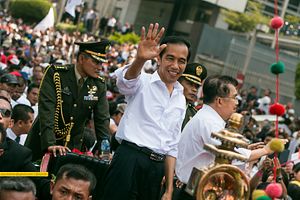With a general election set for April next year in Indonesia, polls consistently have the incumbent, President Joko “Jokowi” Widodo, steps ahead of any likely challenger. Yet that has not stopped anxieties surrounding signs of opposition to Jokowi as we get closer to the election date. A case in point is a viral hashtag that could represent an early indicator of what we might expect in the social media space as Indonesian politics heats up out to next year.
A viral hashtag, #2019GantiPresiden, or #2019ChangePresident, began appearing online in March, data analyst Ismail Fahmi told the Jakarta Post this week. Though metrics are difficult to verify for a whole host of reasons and various origin stories have since surfaced, the hashtag quickly built momentum in Indonesia, one of the world’s social media capitals, by uniting detractors from across the political spectrum.
At an address for supporters in Bogor on April 7, Jokowi initially downplayed the hashtag saying that the only thing which can dislodge a president is the people’s will. Fahmi points to that comment as the fuse which has turned the campaign into a juggernaut. With T-shirts brandishing the hashtag now available for sale on the side of busy thoroughfares from Jakarta to Surabaya, Jokowi’s dismissal has backfired and turned the movement into a bone fide threat.
While social media campaigns have proved time and time again capable of swaying public opinion around the world, in Indonesia the stakes are often much higher. The confluence of online aggression and the real world consequences of vigilantism is seen often here, with individuals publicly identified in posts which then go viral. Targets of these posts can include any individual in any matter of mundane activity, from the poor treatment of domestic workers in public to young men being physically affectionate.
That makes the ad hoc organization of the movement a frightening prospect. With questions lingering over who is behind the hashtag and what its motivation is beyond preventing the reelection of Jokowi, it is already showing a dangerous edge. At a loosely organized demonstration on Sunday, April 29, in Jakarta, footage emerged of a woman in a pro-Jokowi T-shirt protecting her son while being accosted by angry anti-Jokowi protesters. Among Jokowi supporters – or those opposed to aggression in politics – online, the woman quickly became a totem of stony-faced resolution in the face of larger forces. With no apparent clear leader, there is no one to be held responsible for this incident and instead online efforts have been launched to identify the aggressors.
The search to find the brains behind the operation has occupied media in Jakarta, but few definite answers have been forthcoming thus far . Naturally, lawmakers in the pro-Jokowi faction have condemned the movement, saying that the administration’s record speaks for itself and it is all just a farcical attempt to undermine the president. Opponents in the House of Representatives, meanwhile, have claimed that beyond any politicking that might be at play as has been suggested, Indonesians should be free to exercise their rights and protest the president.
Amien Rais, a stalwart of the political scene, has been among the few so far willing to speak publicly in qualified support of the movement, prompting swirling rumors. The movement is unstoppable, he told media in late April. At 74, Rais has taken on an elder statesman role within the National Mandate Party (PAN), which he helped build, and still carries enough weight to worry the Jokowi camp. PAN supported the losing Prabowo Subianto ticket in 2014 and Prabowo’s Gerindra Party seems certain it has secured PAN support for an eventual 2019 announcement.
With no organizers willing to publicly own up to the campaign so far, it is entirely possible – and perhaps likely – that what had begun as a grassroots campaign hatched by voters has been co-opted by savvy t-shirt screenprinters and opposition lawmakers. But with no signs of abating and already at least one incident of aggression under its belt, the prospect #2019GantiPresiden could become a beast no one can control should not be ruled out.
Beyond the campaign itself, with potentially hundreds of other viral hashtags still to be coined, even if #2019GantiPresiden fizzles out, it is an early warning about some of the action we might see in the social media space as we move closer to the election date next year. While attention to particular social media campaigns may wax and wane, the divisive and fluid nature of Indonesian politics means that the social media realm will continue to be a stage upon which fierce battles are fought.

































